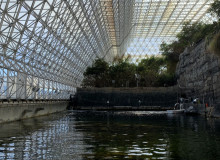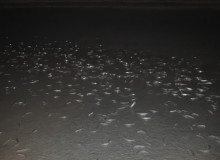Oceans
University of Rhode Island
Inspired by 360-degree cameras utilized by Google Street view, the Ocean Agency developed the Hammerhead Camera, a similar camera designed to be used in an underwater environment, according to Richard Vevers, Ocean Agency founder and CEO.
Planet Forward Sr. Correspondent | Eckerd College
With an increasing demand for waterfront properties and the growing impact of climate change, fishing communities are in danger; but, the societal and economic roles filled by fishing are irreplaceable.
UA School of Journalism
You’re standing on a beach. Warm sunlight streams down, filtering through not just clouds but a geometric glass walls and ceiling. Welcome to the Biosphere 2 Ocean. Hannah Johnson reports for El Inde.
.jpeg%3Fitok=0Jq_3dqj)
Pacific sockeye salmon during the annual migration. The Canadian government recently announced its (CAD) $647 million Pacific Salmon Strategy Initiative. “Hopefully it’s not too little, too late,” says marine campaigner Emmie Page (Image by Oregon State University/https://creativecommons.org/licenses/by-sa/2.0/deed.en).
Northwestern University
In June 2021, a heat wave spread over the Pacific Northwest, with people in the region wilting from record high temperatures. But, Fiona Skeggs reports, the threats are soaring for rivers and marine life as well.
.jpg%3Fitok=0feISmxB)
(Terry Goss/Wikimedia Commons https://commons.wikimedia.org/wiki/File:White_shark.jpg)
George Washington University
Marine scientists are using information collected by everyday people to monitor sharks in the face of climate change.
George Washington University
Scientists recently identified an infectious cyanobacterium as the origin of vacuolar myelinopathy, a lethal neurological disease in wildlife.
Planet Forward Correspondent | University of San Diego
Correspondent Maggie Scholle observes a grunion run, a seasonal phenomenon of fish spawning that lines the Southern California coast.
The George Washington University
Environmentalists and scientists have always asked, how can we save our oceans? One solution, aquaculture, instead asks us to look at ways in which the world's oceans can save themselves.
Worcester Polytechnic Institute
A short story about sea level rise and flooding in East Boston.
George Washington University
For many years U.S. water regulation was an issue with bipartisan support. So what changed? And how are those changes affecting our water and wetlands?







